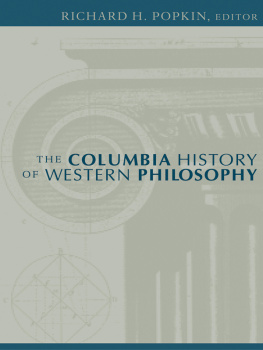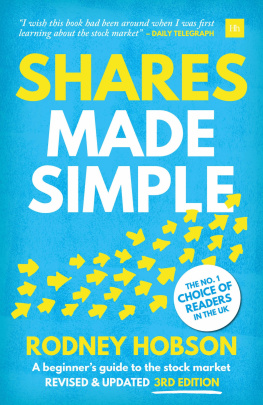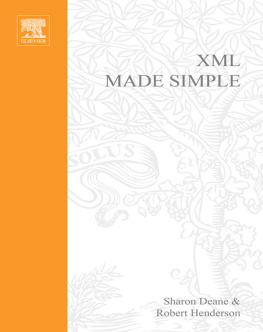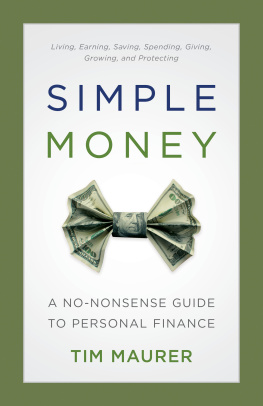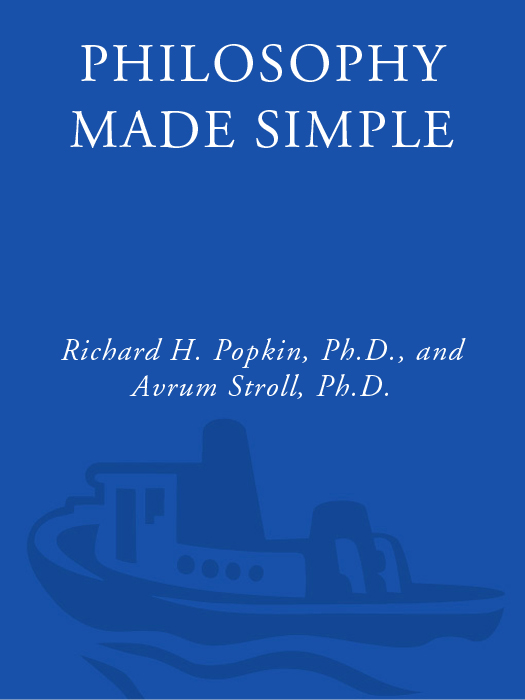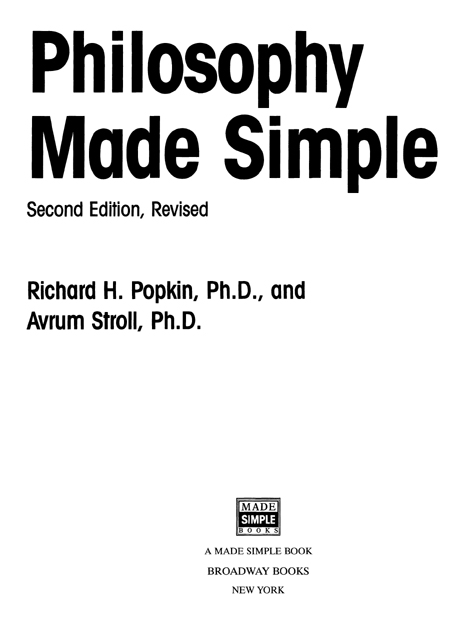A M ADE S IMPLE B OOK
Published by Doubleday, a division of
Bantam Doubleday Dell Publishing Group, Inc.
1540 Broadway, New York, New York 10036
M ADE S IMPLE and D OUBLEDAY are trademarks of Doubleday,
a division of Bantam Doubleday Dell Publishing Group, Inc.
Library of Congress Cataloging-in-Publication Data
Popkin, Richard Henry, 1923
Philosophy made simple / Richard H. Popkin and Avrum Stroll.
2nd rev. ed.
p. cm.
A Made simple book.
1. PhilosophyIntroductions. I. Stroll, Avrum, 1921
II. Title.
BD21.P6 1993
100dc20
92-34537
eISBN: 978-0-307-82325-0
Copyright 1981, 1986 by Heinemann Professional Publishing Ltd.
Copyright 1993 by Doubleday, a division of Bantam Doubleday Dell
Publishing Group, Inc.
All Rights Reserved
v3.1
CONTENTS
Preface
Some years ago the New Yorker magazine ran a typically witty cartoon. The scene was a bookstore and four books were prominently displayed for sale on a table. Their titles could easily be read: the first was Philosophy Made Simple and the next Philosophy Made Simpler. The third said Philosophy Made Still Simpler, and the fourth was Philosophy Made Simplest. Since the first title was that of our own Philosophy Made Simple, the book you are reading now, it occurred to us to ask whether the new edition of this work, the first since 1985, should, following the cartoon, perhaps be entitled Philosophy Made Simpler, or even Philosophy Made Simplest. But when we read over the first edition of the work, we realized that we had made philosophy about as simple as it could be made without distorting the subject drastically, and so in this new edition well leave the title intact.
Apparently, several hundred thousands of readers have agreed with us that the book is simple enough. Philosophy Made Simple has been translated into foreign languages, is sold in nearly every country of the Western world, and in Nigeria, Hong Kong, Singapore, Israel, and Australia. We had expected that this book would be used by ordinary readers, most of whom would have no special training or background in philosophy but would like to know something about this supposedly abstract subject. And many of our readers fall into exactly that category. But the book has also been used as a text in dozens of universities throughout the world. We have received many letters from undergraduate the graduate students, as well as instructors, indicating that it is one of the best and simplest introductions to philosophy to be found anywhere.
Nevertheless, there have been important developments in philosophy during the past three decades. We therefore felt that a new, reworked, and updated edition would be desirable at this time. This new edition thus has extensive changes throughouttoo numerous to be mentioned here. Of course, we should stress that our main focus continues to be on fundamental philosophical problems. These may take new and sophisticated forms, but the great philosophers of the past who addressed these issues are not really dated. Questions about the nature and purpose of human life, about the ideal form that a political association should have, whether one can obtain absolutely certain knowledge about the worldthese questions go to the heart of the philosophical enterprise and will endure as long as human beings are able to use their rational faculties to examine their lives and the environment they inhabit. Philosophy Made Simple is devoted to these important issues. Our update continues this focus but goes on to describe often innovative forms these matters take as we move toward the end of the twentieth century.
Richard H. Popkin
University of California, Los Angeles
Avrum Stroll
University of California, San Diego
What is philosophy?
Philosophy is generally regarded as perhaps the most abstruse and abstract of all subjects, far removed from the affairs of ordinary life. But although many people think of it as being remote from normal interests and beyond comprehension, nearly all of us have some philosophical views, whether we are aware of them or not. It is curious that although most people are vague about what philosophy is, the term appears frequently in their conversation.
Popular usages
The word philosophy is derived from the Greek term meaning love of wisdom; but in current popular usage many different ideas are involved in the ways we employ the term. Sometimes we mean by philosophy an attitude toward certain activities, as when one says I disapprove of your philosophy of doing business or I am voting for him because I favor his philosophy of government. Again, we talk about being philosophical when we mean taking a long-range, detached view of certain immediate problems. When one is disappointed, we suggest to him/her that he/she ought to be more philosophical, as when one misses a plane. Here we mean to say that the person should not be overconcerned with the events of the moment but should try instead to place these in perspective. In still another sense, we think of philosophy as an evaluation or interpretation of what is important or meaningful in life. This usage may be indicated by the story of two men who were drinking beer together. One of them held his glass to the light, scrutinized it thoughtfully, and then observed, Life is like a glass of beer.
His companion looked up at the glass, turned to his friend, and asked, Why is life like a glass of beer?
How should I know, the other answered, Im not a philosopher.
Popular conceptions
By and large, in spite of the many different ways we may use the words philosophy and philosophical in ordinary speech, we tend to think of philosophy as some extremely complex intellectual activity. We often imagine the philosopher (as in Rodins statue of The Thinker) as one who sits pondering questions of the ultimate significance of human life while the rest of us have only the time or the energy to live it. Occasionally, when our newspapers or magazines publish a story about the important philosophers of the past, such as Bertrand Russell or Aristotle, the impression is given that they devoted themselves to contemplation of the problems of the world in a most abstract manner and arrived at views or theories that may sound splendid but can hardly be of much practical value.
While this picture has been created of the philosopher and what he/she is trying to do, there is also another image. This is that the philosopher is one who is ultimately responsible for the general outlook and the ideals of certain societies and cultures. Thinkers such as Karl Marx and Friedrich Engels, we are told, were the ones who created the point of view of the Communist party; while others, such as Thomas Jefferson, John Locke, and John Stuart Mill, developed the theories that prevail in democratic societies.
The Philosophical Enterprise
Regardless of these various conceptions of the role of the philosopher, and regardless of how remote we may think his/her activities are from our immediate concerns, the philosopher has been engaged in considering problems that are of importance to all of us, either directly or indirectly. Through careful critical examination, he/she has tried to evaluate the information and beliefs we have about the universe at large and the world of human affairs. From this investigation, the philosopher has attempted to work out some general, systematic, coherent, and consistent picture of all that we know and think. As we gain more information about the world through the sciences, new interpretations of accepted pictures need to be considered.


